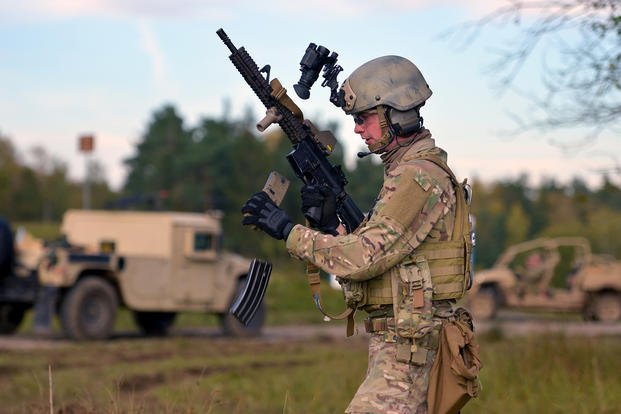If you are thinking about a career change and perhaps wanting to move out of a cubicle, travel the world, challenge yourself with a typical younger person’s profession, this email may resonate with you. There are some things to consider from the physical demands of the training you seek, strain on relationships and monetary issues, to just name a few. However, if you are seeking a career change to any of the special forces/special ops world, start training hard and specifically now. Here is the email question and related answers to many foreseeable issues:
Stew, I am considering a career change from a Phys. Ed teacher to Army Special Forces.
I stay in above-average shape by lifting weights and training for triathlons. My current PFT scores are around 55 push-ups, 80 sit-ups and 14 minutes for the two-mile run. I am looking for some guidance on how long I would need to train (pre-enlistment) to get close to your recommended scores to give myself the best chance to potentially accomplish the goal of qualifying for SFAS or Ranger school. I have all the desire and mental toughness in the world, but I’m also realistic and need to know if the physical components can be realistically accomplished in the next three months or so before signing up.
Believe it or not, your current profession will transition nicely into Army special forces for a few reasons.
1. Army SF are excellent teachers as part of the Foreign Internal Defense (FID) mission they often perform all over the world. Already being a mature, physically oriented teacher is a plus for an SF career.
2. Still in your 20s and training with weights and triathlons, you have much of the cardio and core structural requirements for all the miles of running and rucking you will do throughout your training, selection and qualification courses. Now change your triathlon training to the special ops triathlon; drop the bike and add a ruck.
3. Though your three-month timeline may be a bit optimistic, it is not far from my recommendation. I would give yourself 4–6 months and focus on your PT (pull-ups, push-ups, sit-ups, lunges, squats, plank poses, flutter kicks), some weights to strengthen your core, lower-back strength and shoulder girdle stability, as well as lots of longer-distance running and rucking.
For Army special forces and Ranger training selection programs, you need to have a solid cardio base; build on your running and rucking speed. I would recommend getting between 12 minutes and 13 minutes for your two-mile run tests, as opposed to 14 minutes. And build your rucking pace; see how with related article. It is not a bad idea to do a GoRuck.com Challenge to test your skills by actual Army special forces instructors.
Other related articles:
Log PT: Prepare your shoulders and arms for log PT. If you do not have a log to do a one-man log PT with, use a barbell and do push presses and static overhead holds with 75-80 pounds.
Run/ruck and Leg PT: Mix in runs with leg PT (squats, lunges) with rucks and without rucks. Squats with rucks and lunges without rucks are ideal resistance workouts for leg PT.
Mixing your high-rep calisthenics to ace the physical fitness test, adding rucking to your running program and some specific event weight training will help you prepare quickly on your current foundation of fitness. This can take 16–20 weeks, barring any injuries or illness.
Stew Smith is a former Navy SEAL and fitness author certified as a Strength and Conditioning Specialist (CSCS) with the National Strength and Conditioning Association. Visit his Fitness eBook store if you’re looking to start a workout program to create a healthy lifestyle. Send your fitness questions to stew@stewsmith.com.
Want to Learn More About Military Life?
Whether you're thinking of joining the military, looking for fitness and basic training tips, or keeping up with military life and benefits, Military.com has you covered. Subscribe to Military.com to have military news, updates and resources delivered directly to your inbox.




















